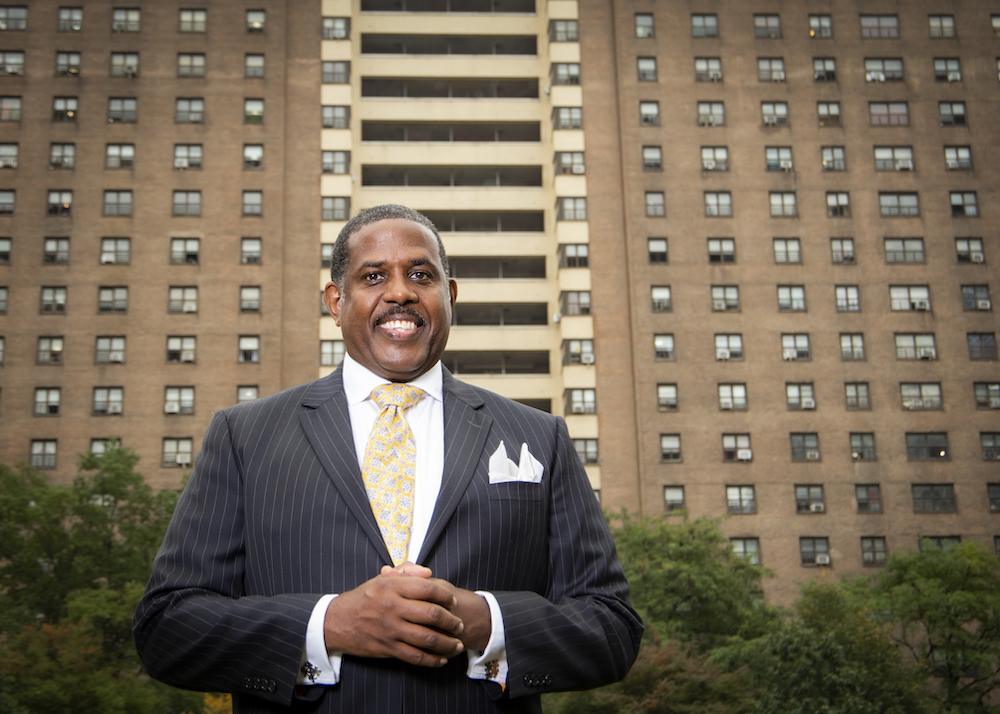NYCHA puts roofs over the heads of hundreds of thousands of New Yorkers. If NYCHA developments were a city, it would be the second-largest in the state. This affordable housing is a lifeline for many New Yorkers. I can personally attest to that, having grown up in the Bushwick Houses. Were it not for our NYCHA unit, my family and I may have been on the street or gone without food. Simply put, NYCHA is too big to fail.
However, our political leadership, both local and national, do not seem to recognize this, because for decades they have effectively told NYCHA tenants to drop dead. The government at all levels has disinvested from the authority. Our representatives seem content to sit back and let the buildings go to hell. And that is precisely what has happened, with rampant heating outages, broken elevators, pest and mold infestations, and other maintenance nightmares being the norm.
We cannot allow our city within a city to endure such inhospitable conditions. That is why I am proposing a New Deal for NYCHA. Just as the federal New Deal created thousands of jobs while building some of our most important infrastructure, we can do the same for our NYCHA developments. And with billions likely coming to NYCHA when Congress passes President Joe Biden’s infrastructure bill, the time to act is now.
A NYCHA New Deal would jumpstart the many repairs and capital improvements that the developments desperately need. Not only can we rehabilitate them to a decent standard, but also make them better than ever. We can reduce the developments’ carbon footprint to zero by building solar microgrids, improving insulation, installing electric heaters, and replacing appliances with energy-efficient ones. We can install toilets that use water more efficiently. And we can upgrade HVAC systems and repair leaking roofs, which will cut down on the humidity causing rampant mold.
A NYCHA New Deal would also mean jobs, jobs, and jobs. By one estimate, it would directly and indirectly generate about 326,000 jobs over a decade, including almost 12,000 a year in construction alone. This, in turn, would have an economic impact of $96 billion.
But we can do more than merely repair and upgrade NYCHA developments. We must also incorporate economic justice, at a time when ensuring equity is critical to our post-pandemic recovery. That means not creating junk jobs, but union building trades jobs. These jobs pay a living wage with benefits, and provide workers with training in portable skills that set them on a lifetime career track. For new building trades jobs, NYCHA residents must receive priority in training and hiring, which will give tenants the economic boost they deserve. Based on one projection, this could create over 4,300 jobs for NYCHA residents, who would then be on the fast track to economic mobility.
Besides helping NYCHA tenants, the New Deal gives us another opportunity for economic justice: utilizing M/WBE contractors. We must have an M/WBE utilization rate of at least 30%, the same as required on state projects. This will inject more capital into people and communities that have been historically disadvantaged and underserved by government – including the many people of color living in neglected NYCHA housing.
As one might expect, a NYCHA New Deal carries a significant price tag. The estimated cost is about $40 billion, and for every year we do not act the cost goes up by another billion. Even if we borrowed that amount of money, issuing a 30 year bond with level debt service would still cost about $3 billion a year. As a comptroller candidate, I know how to make these calculations. However, we simply cannot fail to act, particularly given the fact that inaction will cost us billions more.
Besides rehabilitation, there is more we need to do for NYCHA tenants. We must not only redevelop the physical infrastructure, but the organizational infrastructure as well. NYCHA tenants need to have more say in their own homes – and their own destinies. The developments’ residents have the greatest vested interest in making their homes the best they can be, so they are best suited to make decisions and address issues. People living in the development will be much more motivated to remove mold or fix elevators than a civil servant miles away. That is why tenant associations must be empowered to make binding decisions about developments and their management, such as choosing contractors and managing agents. We can even go a step further by piloting the conversion of some NYCHA developments into limited-equity co-ops, making tenants both the decision-makers and the owners of their homes.
NYCHA is part of the very fabric of our city. And as someone who grew up in NYCHA housing, I cannot and will not fiddle while Rome burns. When it comes to a New Deal for NYCHA, I am reminded of a Chinese proverb: The best time to plant a tree was 20 years ago, the second-best time is now. We may have to settle for the second best, but that is what NYCHA residents need and deserve.
State Sen. Kevin Parker is a candidate for city Comptroller.







